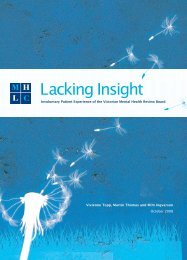Reducing Ethnic Profiling in the European Union - Open Society ...
Reducing Ethnic Profiling in the European Union - Open Society ...
Reducing Ethnic Profiling in the European Union - Open Society ...
- No tags were found...
You also want an ePaper? Increase the reach of your titles
YUMPU automatically turns print PDFs into web optimized ePapers that Google loves.
and Wales have used <strong>the</strong> package. Most have seen a reduction <strong>in</strong> levels of disproportionalityafter act<strong>in</strong>g on assessments that showed poor management of <strong>in</strong>telligence,poor communication of that <strong>in</strong>telligence to front l<strong>in</strong>e officers, and lack oflocal accountability.In response to <strong>the</strong> sporadic application of <strong>the</strong> POP package, <strong>the</strong> National Polic<strong>in</strong>gImprovement Agency (NPIA) developed a new diagnostic tool, “Next Steps.” NextSteps encourages appropriate and effective use of <strong>the</strong> stop-and-search power whileexpos<strong>in</strong>g <strong>in</strong>appropriate, <strong>in</strong>effective use of <strong>the</strong> power, particularly when it is hav<strong>in</strong>ga detrimental impact on community confidence. Next Steps identifies key build<strong>in</strong>gblocks for <strong>the</strong> effective use of stops and searches:• Accurate local data• Informed and responsive task<strong>in</strong>g• Effective brief<strong>in</strong>g• Good quality encounters• Effective communication with local communities• Stops and Searches are based on “reasonable grounds” that would satisfyan objective observerThe NPIA has piloted <strong>the</strong> Next Steps diagnostic tool <strong>in</strong> three forces: <strong>the</strong> MetropolitanPolice Service, <strong>the</strong> Merseyside Police, and <strong>the</strong> Dorset Police. The tool will <strong>the</strong>nbe revised and rolled out nationally. There are <strong>in</strong>itial concerns that Next Steps doesnot <strong>in</strong>clude any community <strong>in</strong>volvement <strong>in</strong> <strong>the</strong> evaluation of police activity and thatf<strong>in</strong>d<strong>in</strong>gs will only be shared with <strong>the</strong> police force and not made public. There is noexternal evaluation planned to determ<strong>in</strong>e how effective and robust <strong>the</strong> Next Steps isas a tool, and as <strong>the</strong> NPIA has no power of enforcement problems identified dur<strong>in</strong>g<strong>the</strong> audit can simply be ignored by police forces if <strong>the</strong>y wish.General pr<strong>in</strong>ciples of good practice <strong>in</strong> conduct<strong>in</strong>g policy audits:Policy audits should use multiple <strong>in</strong>formation sources—both <strong>in</strong>ternal and external.A policy audit will have greater public legitimacy if it <strong>in</strong>cludes non-law enforcementpersons from m<strong>in</strong>ority communities.The audit process must be open and transparent and results of policy auditsshould be made public and discussed with all stakeholders.Policy audits must be followed up with concrete actions on key recommendations<strong>in</strong> budgets, legislative action, and through <strong>the</strong> assignment of personnel or o<strong>the</strong>rresources as necessary.REDUCING ETHNIC PROFILING IN THE EUROPEAN UNION 137
















